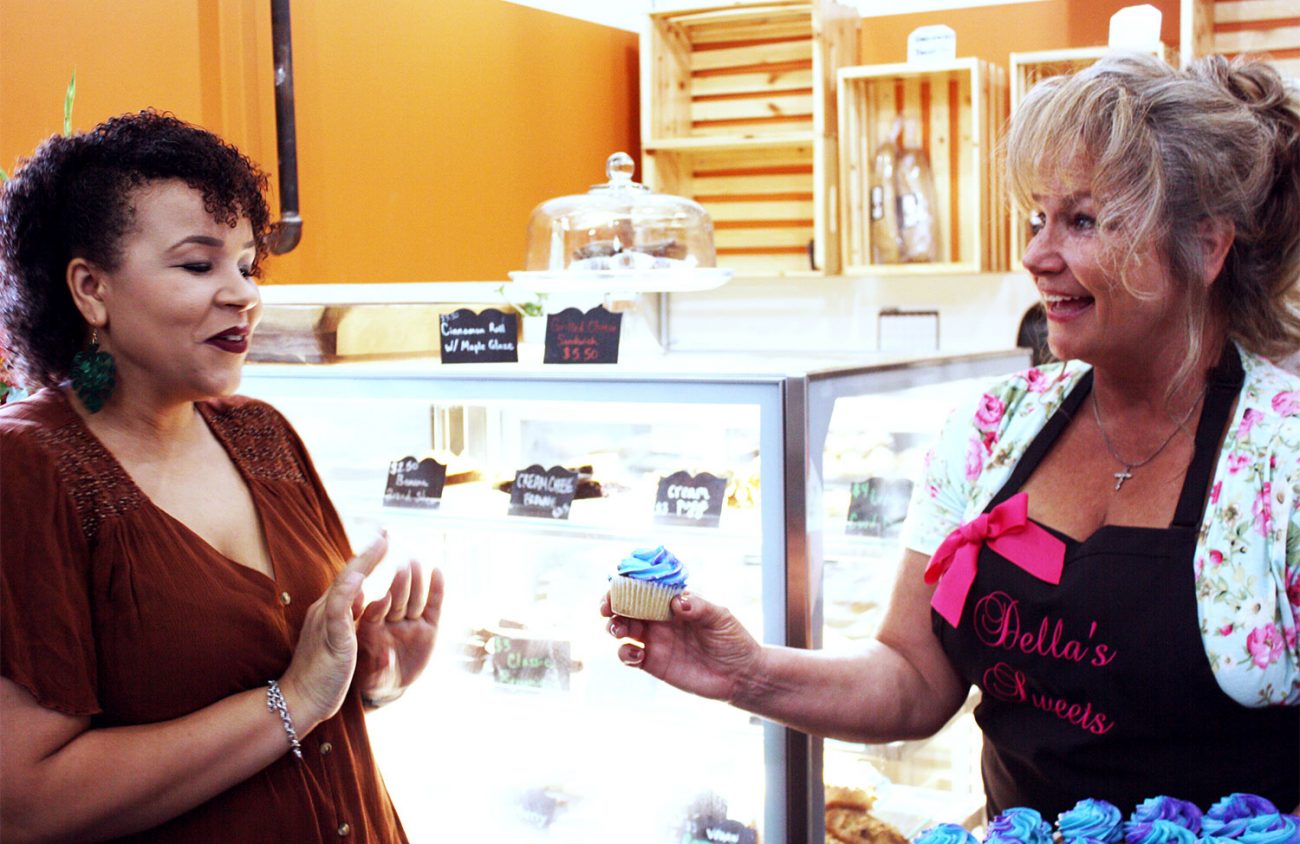I confess, as I was slouching in my seat awaiting the opening act of The Cake, a “timely new comedy” by Bekah Brunstetter now playing at Oregon Contemporary Theatre, I started to cop an attitude. We all know what “timely” means these days.
I suspected I was in for an ideological slam-dunk, in which the low-hanging fruit of evangelical nonsense — in this instance, a baker who won’t sell a wedding cake to a lesbian couple — was plucked for smug laughs by a gaggle of Park Slope progressives who run comic circles around the shallow-deep homophobia of those Red State rednecks.
In other words, I expected not to be enlightened but flattered and pandered to, simply for being on the right side of history, and for rubbing shoulders warmly with the good guys and making fun of the bad guys.
Well, God knows, I’ve been wrong before.
One of the wonderful things about art is its infinite capacity to foil your expectations. From the opening scene, in which Della (Tinamarie Ivey) — a devout Christian who runs a bakery in North Carolina — waxes poetic about the culinary joys of butter, The Cake declares itself as something more than a satiric takedown.
Into its basic and “timely” premise the play injects a disarming amount of complexity and pathos. Returning home from New York to get married, Jen (Tara Wibrew) visits her late mother’s friend, Della, hoping she’ll bake one of her delicious cakes for her upcoming wedding with her fiancée, Macy (Anya Pearson). Della, taken off guard and leaning on the piousness of her husband Tim (Patrick Dizney), begs off the task, claiming to be too busy when, actually, she’s hit a huge crisis of faith.
It would have been easy to milk this scenario for the low comedy of high outrage, turning it into a puppet show of attitudes and indictments, but instead playwright Brunstetter makes a deep dive for understanding, and the results are often sublime and hilarious. The writing is superb, finding just the right tone in which to eke out each character’s moral reckoning, and Willow Jade Norton’s direction finds a compassionate rhythm that gives the play an atmosphere of heartfelt intimacy and authentic struggle.
OCT is developing a strong aesthetic of producing chamber-piece plays that squeeze small casts into fierce domestic dramas that blossom out, with subtle comic gestures, into broader world concerns. This play hits that sweet spot perfectly. Its warmth and humor draw you in, only to be pleasantly confounded by the sneaking gravitas of its subject matter — here, the way our traditional ideas and lifelong beliefs tend to complicate, and submerge, our very humanity.
This is the real strength of the play, and it treats these issues with equanimity and great artistry. Snap judgments fall flat in the face of the characters, each of whom is portrayed with uncommon empathy, more at war with his or her own conscience than each other.
The cast is wonderful. Wibrew captures the confusion of a woman torn between her family history and her desires, and her grappling with her religious upbringing is uneasy and excruciating, and not a matter of simple severance from the past. Dizney, as Della’s sexually repressed husband, brings a vulnerable sense of grief to the role.
Oddly enough, the character I found most unlikeable (at first) is the one I should agree with most: Jen’s fiancée, Macy, the furious fighter for social justice who draws a righteous line in the sand between herself and no-cake-bakin’ Della, urging Jen to make a decision. And yet, excellently portrayed by Pearson, even Macy must confront the rigors and intolerance of her devoutly held beliefs, if only out of love, as she moves toward a moment of reckoning.
The play, in the end, belongs to Ivey, who anchors the drama with a powerhouse performance that gives a rare dignity to the spiritual and moral struggles of an essentially good person. It’s impossible not to like Della, despite her choices, and the fact that we see the uncertainty and fear driving those choices only add to the sympathy evoked by Ivey’s portrayal.
It’s always struck me as odd that we attack bigots for being too Christian, when what they’re being is not Christian enough. Where we rest on the spectrum of faith has nothing to do with it, and The Cake appeals to the universality of what, after all, was Christ’s second greatest commandment — to “love one another,” regardless. This isn’t a matter of whether we believe in God; it’s a matter of whether we believe in each other, and this play has something profound to say about that question.
The Cake plays through Oct. 13 at Oregon Contemporary Theatre; for tickets and times, visit octheatre.org or call 541-465-1506.
